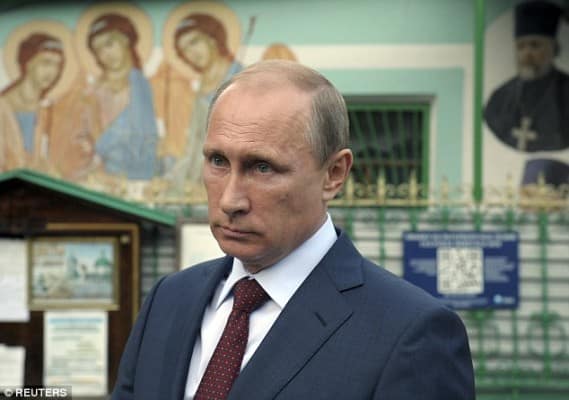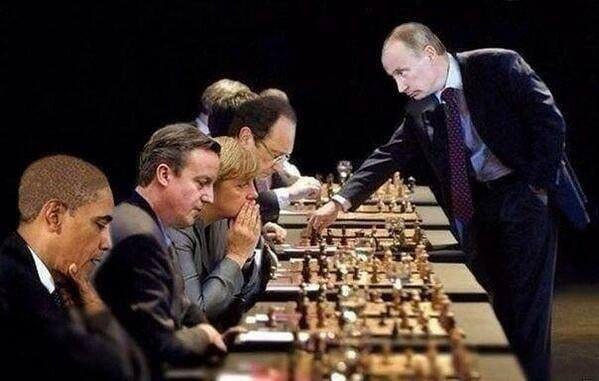![]() THE WEST’S GREAT WAR AGAINST RUSSIA
THE WEST’S GREAT WAR AGAINST RUSSIA
Syria, the Ukraine, and other battlefields are just proxy conflicts. The object is the defeat and destruction of Russia as an independent world power.
SPECIAL GUEST EDITORIAL BY FORT RUSS
=By O. Richardson, I. Sinchougova, and J. Flores=
The first and most responsible thing that journalists and analysts should be pointing out, is that Putin has stated that the reason for this withdrawal is that the primary objectives have been accomplished. The second is that this is not a ‘withdrawal’ of Russian forces from the Syrian conflict in general, but a withdrawal of certain ground forces from the now secure areas around Latakia.
It may also indicate a withdrawal (or redeployment) of certain ‘volunteer’ type special forces and ‘retired advisers’ embedded with SAA and allied units in central, eastern and northern Syria. These are less known about, but which might have otherwise been brought up and publicized in media by the foreign backed opposition negotiating team, and at the negotiating table in Geneva.
This last point would have most certainly been a ‘demand’ by the opposition negotiating team, one which Russia probably would have conceded, because those forces are no longer critical. Latakia is now secure, and the advisers have completed their live training.
But by doing this unilaterally, before bargaining, the opposition has lost the ability to claim this as a success at the table, as a reflection of their own political will and strength. Yet the Russians reap the same benefits, and are seen as reasonable and moving forward in good faith towards a peaceful resolution.
Indeed, in today’s world, military strategy exists beyond the narrow sphere of armed conflict, and an equal part of any success is winning the information war. It is therefore critical to understand what role in the information war Putin’s announcement plays. We also need to understand what is meant in fact, by ‘withdrawal’. At root is the fact that the way that Russia understands and explains its foreign policy is very different from the way the US does. For these reasons, western audiences, accustomed to hearing American explanations of its moves, seem to be a bit lost on this one – and understandably so.
In this case, the ‘withdrawal’ is not a withdrawal, at least, not the way the term is commonly understood in the West. We are better informed if we understand this to be ‘an operation by which a military force disengages from the enemy’. There are a lot of good reasons to do this, and it reflects the fact that Russia has helped Syria achieve the sort of upper-hand needed to handle certain matters on their own – specifically security for the Latakia air-base. It’s also going to help Russia at the upcoming peace talks in Geneva.
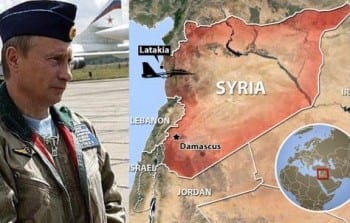 But why does that word – yes, ‘withdrawal’ – leave such a funny taste in our mouths? It’s because a funny thing happened along the way in the development of US foreign policy lingo. The term ‘defeat’ was replaced with the term ‘withdrawal’. This happened as a result of needing to soft-sell major defeats like Vietnam or Iraq. Defeats were re-branded as ‘withdrawals’, even though in doing so, the term withdrawal was forever changed into a synonym for defeat, and a lack of resolve. A similar thing happened to the word retreat. In actuality, strategist may well look at any strategic map and say, ‘Well, we ought to withdraw forces from here, and deploy them over there’. It is a neutral term at its core. Forces can be withdrawn, and they can even retreat, but it would be an error to equate these with either a tactical set-back or a defeat.
But why does that word – yes, ‘withdrawal’ – leave such a funny taste in our mouths? It’s because a funny thing happened along the way in the development of US foreign policy lingo. The term ‘defeat’ was replaced with the term ‘withdrawal’. This happened as a result of needing to soft-sell major defeats like Vietnam or Iraq. Defeats were re-branded as ‘withdrawals’, even though in doing so, the term withdrawal was forever changed into a synonym for defeat, and a lack of resolve. A similar thing happened to the word retreat. In actuality, strategist may well look at any strategic map and say, ‘Well, we ought to withdraw forces from here, and deploy them over there’. It is a neutral term at its core. Forces can be withdrawn, and they can even retreat, but it would be an error to equate these with either a tactical set-back or a defeat.
It would also be equally an error to equate Russia’s so-called withdrawal with any change in commitments, or any turning of the tides against Russia or the SAA. For those not closely following the Russian campaign, the six months of work in clearing out major ISIS targets in central and northern Syria, while also securing the coastal areas around Latakia, can only be characterized as a string of tactical and strategic successes.
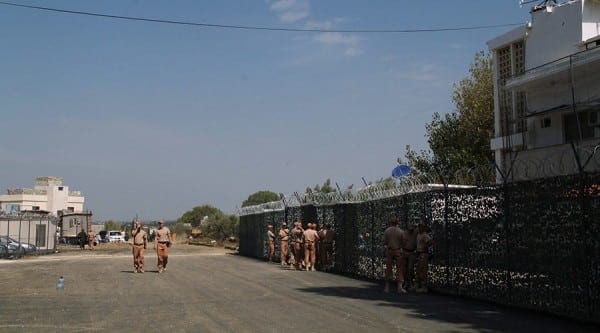
In just a few months the Russians converted a neglected airfield in the Latakia area into the hub of their tactical and strategic operations in Syria. That in itself was a remarkable logistical success.
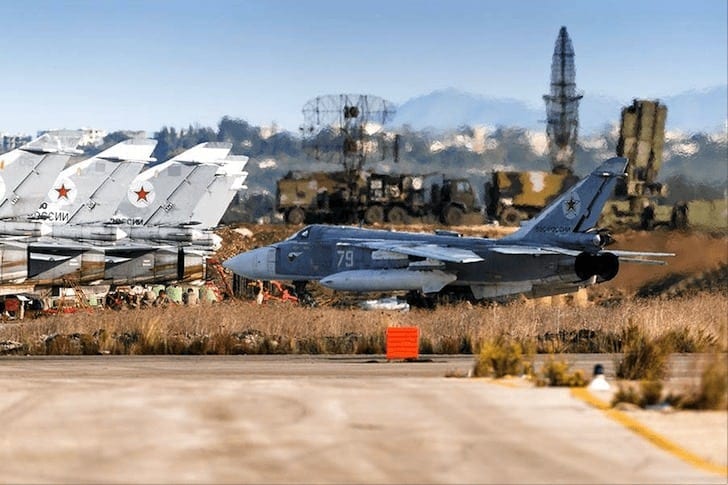
ABOVE: A Su-24 tactical bomber taxies in the Latakia AFB. An S-400 anti-aircraft battery can be seen in the background. BELOW: The Latakia installation from the air. Russian assault jets can be seen parked on the tarmac.
 Yes, making drastic victories in a short period of time is also a good reason to withdraw afterwards. You might recall that the point of a just war is to bring about peace – not prolong a conflict unnecessarily.
Yes, making drastic victories in a short period of time is also a good reason to withdraw afterwards. You might recall that the point of a just war is to bring about peace – not prolong a conflict unnecessarily.
Removing some of Russia’s forces from Syria is designed to stimulate a political resolution of the conflict. The Russian air force and navy will remain in Syria, which means airstrikes against Daesh (ISIS), al-Nusra and some groups that belong to the so-called opposition, but are not party to the ceasefire, will continue – Russia’s continued presence there is not to have a cup of tea and watch the sun rise.
Such a move can be read as, and can signify, both a mark of good faith towards a resolution, and also tremendous confidence in the progress made to date. To better underscore that, let’s suppose the opposite; that Putin had declared instead that Russia would be increasing its efforts and presence in the conflict. Would that signify that things were going well, or not well enough?
Certainly there would be no question about Russia’s ‘resolve’ and ‘commitment’, in the way that ‘withdrawal’, when construed wrongly, can be interpreted. But that also relates to the way that the US has described its own foreign policy. Whenever the US has faced major setbacks but hadn’t yet accepted defeat, it explained its need to increase its presence or intensity as proof of its ‘resolve and commitment’. Evidence of defeat had therefore been re-framed for the public as evidence of resolve.
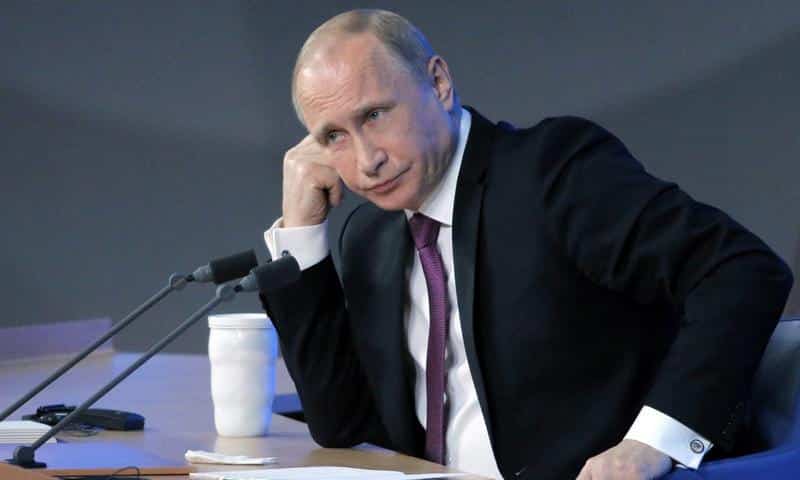 So, to understand Russia’s approach also involves a little bit of deconstructing some of the associations we’ve been led to make so far about certain words.
So, to understand Russia’s approach also involves a little bit of deconstructing some of the associations we’ve been led to make so far about certain words.
The reality is, a political process toward a resolution would never be on the cards without Russia’s air strategy in Syria. The decision to withdraw troops signifies a shift from Russia’s military to the army of Bashar al-Assad. The SAA’s offensive continues to move eastward. The battle for Palmyra is taking place as we speak, which is more than just symbolic. Now, the focus will shift to the negotiations in Geneva. To say that Putin has betrayed the Syrian people, or its allies Iran, Hezbollah, the SAA, is simply incorrect in our view.
[dropcap]O[/dropcap]riginally, the SAA did not have the capacity to carry out a coherent military strategy against a terrorist group that was continually funded by the US State Department. After Russia’s intervention, this is no longer the case. They are more organized and they have a coherent military strategy. To assume that we know the full extent of the talks and agreements that took place between Assad and Putin is naïve – and to withdraw without a continued military strategy would be nonsensical.A political resolution was always going to be the endpoint – because the only alternative is a permanent Russian presence in Syria. This is a move to deescalate the situation in the region, and is an attempt to use political bargaining, as Putin had said is the preferred option from the beginning.
In this time-frame before the coming peace talks, the Saudi-Turkish-Qatari alliance has tried to make up for losses on the battlefield by shifting the negotiating process towards the media spectacle. This came with the ludicrous demand that Syria must accept, as a precondition to resolution negotiations, the very outcome which the invading alliance wants in the first place: a regime change that would see the removal of the Syrian government, cynically termed a ‘transition’.
But objectively speaking, it seems quite a strange demand to make, given that it is irrational to think one can achieve those things at the bargaining table which the reality on the ground has denied. Negotiations, by and large, are but a reflection of the reality on the ground.
In summary, Russia has not abandoned Syria to its own devices, as is being pushed by some media outlets. Neither are Putin’s decisions cryptic or illogical when the following is taken into account;
1) Russia’s main operation was to clear the Latakia coast, marginalizing Daesh and its allies. This has been accomplished, and as a result, many units were left with little to do outside of an occasional artillery barrage.
2) Russia’s air force currently completes around 50% of the sorties that it was carrying out in October and November 2015. The ceasefire agreement and the decrease in activity is a reflection of that success.
3) The ceasefire created much takfiri in-fighting, thus helping Syrian and allied forces further.
4) Russia can bring back whatever ground units they withdraw, even on a rotational basis, if that is needed by Syria. Russia was not ‘pushed’ out of Syria, nor has their mandate somehow expired. The Syrian requirement of the Russian force in Syria is and always has been determined by the Syrian government itself.
5) The decision was coordinated with Iran and Assad and likely was a way to keep the Higher Negotiations Committee from claiming it as a victory at the negotiating table. The air bases and naval bases (S400’s too) are staying, which is the core of Russia’s presence, which paved the way to the Geneva talks in the first place.
What we can say is that it is both premature and unsubstantiated to claim that Putin’s move here is wrong when the discussions with Assad and his Iranian allies were not public. While the often cryptic statements and moves of Russia’s president can often leave even those sympathetic to Russian endeavours perplexed, one thing we know for certain is that so far these have worked. It’s all part of a strategy that’s winning.
=SELECT COMMENTS (from original thread)=
Note to Commenters
Due to severe hacking attacks in the recent past that brought our site down for up to 11 days with considerable loss of circulation, we exercise extreme caution in the comments we publish, as the comment box has been one of the main arteries to inject malicious code. Because of that comments may not appear immediately, but rest assured that if you are a legitimate commenter your opinion will be published within 24 hours. If your comment fails to appear, and you wish to reach us directly, send us a mail at: editor@greanvillepost.com
We apologize for this inconvenience.
![]()
 Nauseated by the
Nauseated by the
vile corporate media?
Had enough of their lies, escapism,
omissions and relentless manipulation?
Send a donation to
The Greanville Post–or
But be sure to support YOUR media.
If you don’t, who will?



